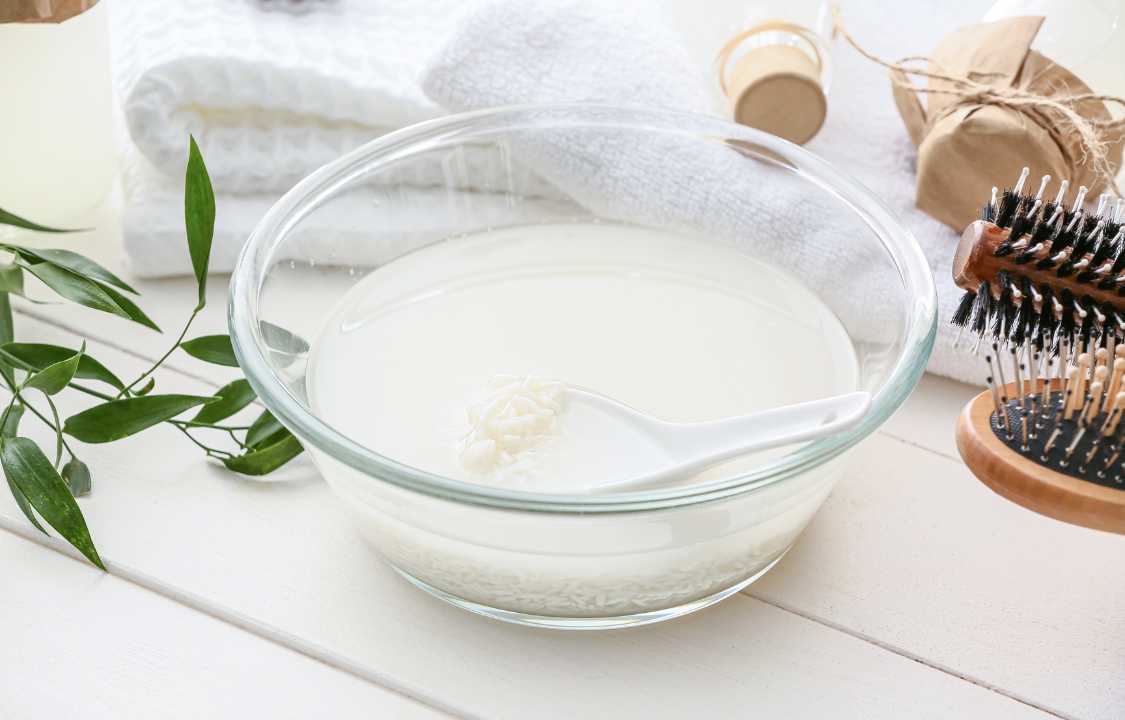Health Benefits
What to Know About Rice Water for Hair
For centuries, rice water has held an esteemed position in Asian cultures as a versatile beauty treatment. In recent times, it has resurfaced in the limelight, with beauty influencers hailing it as a miraculous elixir for fostering long, healthy hair. The fervor surrounding rice water’s potential benefits for hair has left many intrigued and curious. Is this phenomenon genuinely efficacious, or is it merely the product of social media hype? We are here to embark on a journey to uncover the mysteries of rice water for hair.
Demystifying Rice Water
Rice water, as the name suggests, is the water left behind after rice has been cooked or soaked in it. This humble ingredient is a rich reservoir of nutrients, including:
- Inositol
- Vitamin E
- Vitamin B
- Magnesium
- Fiber
- Zinc
- Manganese
Some of these constituents are of particular importance in promoting healthy hair:
1. Vitamin E: This vitamin, rich in tocotrienols, a type of antioxidant, has demonstrated its potential to stimulate hair growth, especially in individuals with alopecia, a condition characterized by hair loss.
2. Magnesium: A vital mineral essential for various bodily functions. Studies involving women with thinning hair have shown that oral magnesium supplementation can significantly boost hair growth within 90 to 180 days.
3. Vitamin B (Biotin): Biotin, one of the B vitamins, is closely associated with hair growth. A deficiency in biotin has been linked to hair loss, as it plays a crucial role in the production of keratin, a key structural protein for healthy hair and nails.
4. Zinc: Zinc is another essential mineral for hair health. Hair loss can result from a zinc deficiency, as it is pivotal for the growth and repair of hair tissue. Supplementation with zinc has proven effective in reducing hair loss in individuals with a zinc deficiency.
Preparing Rice Water for Hair
The beauty of rice water lies in its simplicity and affordability. Several methods are popular for preparing rice water:
1. Short Soak: Begin by rinsing one cup of rice and adding two to three cups of water. Allow the rice to soak for a duration ranging from 30 minutes to two hours.
2. Boiling Method: Cook rice as you normally would but with extra water. After cooking, strain the rice, preserving the water for use on your hair.
3. Fermented Method: Devotees of rice water treatment believe that fermenting soaked rice water for two to three days enhances its antioxidant and vitamin content.
While preparing rice water, it’s advisable to opt for the short soak method as boiling may potentially diminish some of the vitamins, and fermentation may introduce bacteria. To utilize rice water, follow your regular shampoo and rinse routine. Afterward, pour the rice water over your hair, leaving it in for approximately 20 minutes before thoroughly rinsing with warm water.
The Efficacy of Rice Water for Hair
Although there exists a wealth of anecdotal evidence attesting to the hair growth-promoting potential of rice water, there is a notable absence of scientific confirmation supporting these claims. The village of Huangluo in China stands as an emblem of rice water’s purported efficacy in hair care. Its inhabitants, renowned for their “World’s Longest-Haired Village” title in the Guinness Book of World Records, incorporate rice water into their hair care rituals. However, scientific investigations regarding vitamins and minerals have mainly focused on individuals with deficiencies rather than those with normal nutrient levels. Additionally, most studies have concentrated on the oral intake of these vitamins and minerals, rather than their application to hair.
Exploring Side Effects
Rice water treatments are generally safe with minimal associated risks. However, it’s advisable for certain individuals to consult with a healthcare professional before experimenting with rice water. These individuals include:
1. Eczema Sufferers: People afflicted with eczema or atopic dermatitis often experience skin inflammation and itching due to impaired moisture barrier function. While rice water may not pose problems for those with eczema, a small patch test or consultation with a dermatologist is recommended.
2. Hair Loss Concerns: Individuals facing hair loss should exercise caution when considering rice water as an initial treatment. Hair loss can arise from various underlying causes, many of which have approved and effective treatments. It is advisable to consult a healthcare provider before attempting rice water treatment.
Proven Strategies for Accelerated Hair Growth
For those seeking scientifically validated methods to foster hair growth, the following strategies offer credible alternatives, either in conjunction with or as an alternative to rice water treatment:
1. Nutrient Deficiency Evaluation: Undergo assessment for nutrient deficiencies to address any underlying causes of hair loss.
2. Balanced Diet: Adopt a well-rounded and nutritious diet, ensuring adequate intake of essential vitamins and minerals like B and D vitamins, iron, zinc, and omega-3 fatty acids.
3. Biotin and Collagen Supplements: Consider supplementation with biotin and collagen, both recognized for their contributions to hair health.
4. Heat and Chemical Treatment Reduction: Limit exposure to heat treatments and chemical hair treatments that may harm your hair’s integrity.
5. Gentle Hair Care: Avoid brushing wet hair, as it is most vulnerable to damage.
6. Regular Trims: Schedule routine hair trims every six to eight weeks to maintain healthy hair and remove emerging split ends.
In conclusion, rice water presents a captivating yet unverified avenue for hair care. The journey to long, lustrous hair may involve a holistic approach that takes into account nutrient intake, gentle hair care practices, and, when necessary, guidance from healthcare professionals. While rice water’s role in this process remains open to interpretation, it undoubtedly contributes to the broader canvas of beauty rituals, offering an affordable and accessible treatment for those seeking to unlock the secrets of healthy hair.

